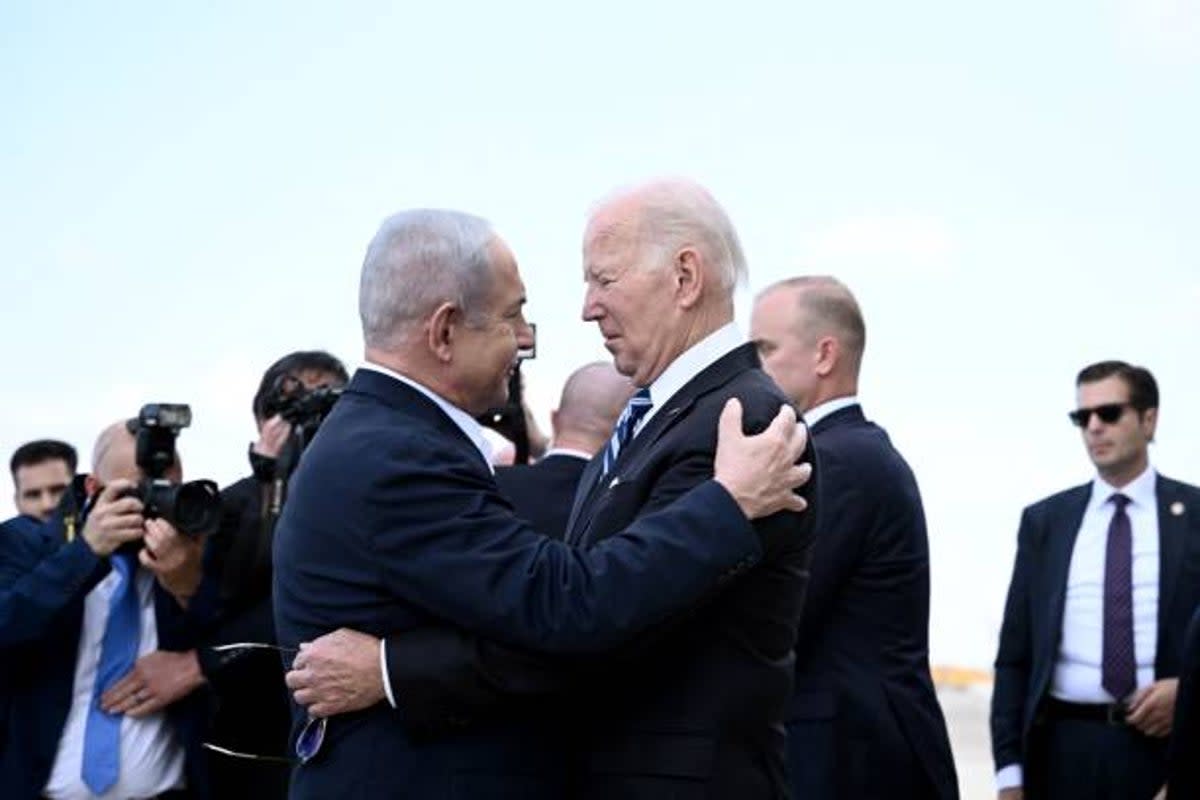Netanyahu goes against Biden and reiterates there’s ‘no space’ for Palestinian state

Israeli prime minister, Benjamin Netanyahu, has doubled down on steadfast resistance to the idea of Palestinian statehood, widening the apparent rift with his closet international allyJoe Biden.
Mr Netanyahu is also facing anger at home with thousands of Israelis holding protests against the leader in Tel Aviv and demanding a new election over alleged mishandling of the nation’s security.
Defying pressure from the US government and allies around the world over the future of Palestinian statehood, Mr Netanyahu sparred with Mr Biden publicly following their phone call over the weekend as the two leaders gave differing views of their interaction.
“In his conversation with President Biden, prime minister Netanyahu reiterated his policy that, after Hamas is destroyed, Israel must retain security control over Gaza to ensure that Gaza will no longer pose a threat to Israel, a requirement that contradicts the demand for Palestinian sovereignty,” a statement from the Israeli prime minister’s office said.
It was just hours after Mr Biden said of the same conversation that he was confident of the possibility of independent Palestine under Mr Netanyahu’s leadership.
Discussing his administration’s position Friday, Mr Biden said "there are a number of types of two-state solutions" and, asked if a two-state solution was impossible with Mr Netanyahu in office, Mr Biden replied, "No, it’s not."
In a post on X, formerly known as Twitter, Mr Netanyahu reiterated that Israel must retain "security control over the entire area west of Jordan", a part which also includes the Israeli-occupied West Bank territory.
The comments following Mr Biden and Mr Netanyahu’s first conversation in nearly a month appear to show evident cracks with the allies in the US and UK, who have called for restraint as Israeli forces bombed Gaza, killing a number of Palestinians, in their action against Hamas.
A British government spokesperson also called Mr Netanyahu’s comments “disappointing” and reaffirmed support for the two-state solution.
“The UK’s position is very clear. A two-state solution, with a viable and sovereign Palestinian state living alongside a safe and secure Israel, is the best route to lasting peace.”
The US president who since the beginning of Israel’s ground operation in Gaza has offered the most unconditional support while calling for restraint and repeated that establishment of an independent Palestinian state should be the solution for rebuilding Gaza.
It comes as his government is facing pressure at home as thousands of Israelis gathered in a central Tel Aviv square on Saturday to demand new elections with many banging drums and yelling in anger.
"The government that abandoned us on 7 October continues to abandon us every day since - those evacuated from the northern and southern (borders), the families of the victims, the reservists, the hostages," Noam Alon, whose brother, a soldier, was killed trying to clear an Israeli town from Hamas gunmen told Reuters.
"The power is in our hands to change and repair," she said from the stage. "This government needs to go home. Now!"
Many others demonstrated outside the prime minister’s house to join the families of the more than 100 remaining hostages held by Hamas and other militants. They raised fears that Israel’s military violence in Gaza further endangers hostages’ lives.
Dozens of anti-war protesters converged in the Israeli city of Haifa, raising signs reading "Stop genocide" and clashed with police who tried to confiscate the placards.
Divisions have also become evident in his wartime “unity” cabinet. Critics have said Mr Netanyahu is trying to appease members of his right-wing ruling coalition by escalating the conflict against Hamas and preventing a Cabinet-level debate about a post-war scenario for Gaza.
After nearly four months of the war, the Israeli bombardment of Gaza has killed nearly 25,000 Palestinians, mostly women and children and displaced nearly two million people. The city has been reduced to ruins with now hunger and disease creeping into the crowded camps.
The war has escalated into a full-scale crisis in the Middle East with Iranian-backed groups attacking US and Israeli targets.
Tensions between Israel and Hezbollah militants in Lebanon pose a looming risk of escalating into a full-scale war, while Iran-backed Houthi rebels in Yemen are actively targeting international shipping in the Red Sea despite ongoing US-led airstrikes.


